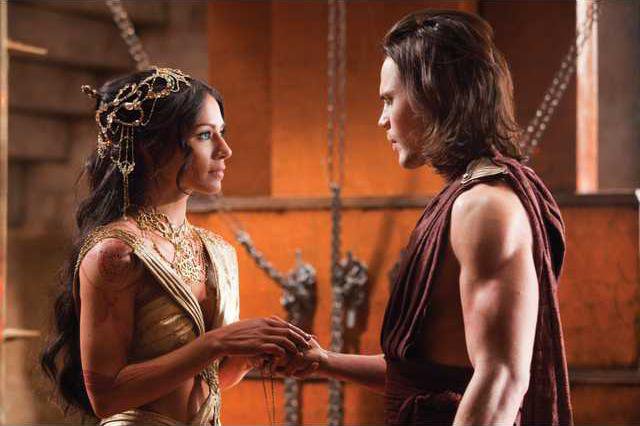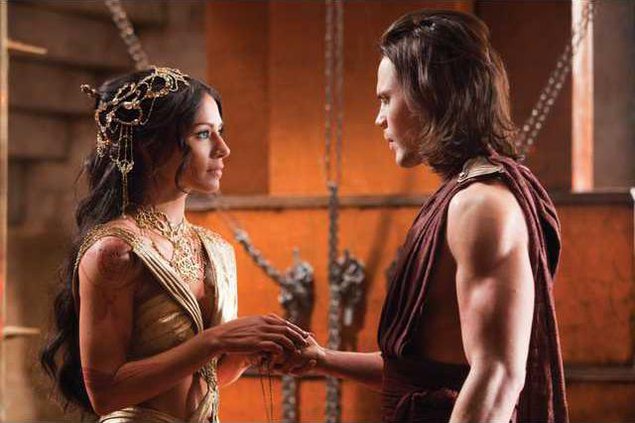‘John Carter'
Starring: Taylor Kitsch, Lynn Collins, Samantha Morton, Mark Strong, Ciaran Hinds
Rated: PG-13, for intense sequences of violence and action
Runtime: 2 hours, 19 minutes
Bottom line: A monumental mess
"John Carter" bears all the telltale signs of a troubled production. Unmotivated actions, logical leaps and undeveloped subplots litter the red planet's landscape from beginning to end.
Despite being blessed with a $250 million budget, a brilliant director and all the talent Disney has to offer, this is the kind of movie we want to like but we spend most of our time wondering why things are happening rather than just enjoying the action.
A brief history of how Edgar Rice Burroughs' character made it to the big screen reminds us how predictable it was that this Disney tentpole would collapse under its own weight.
John Carter first appeared in print in serialized form in 1912. Those episodes were later published as the novel, "A Princess of Mars." Burroughs continued his Mars series for years, and Carter reappeared in several books.
Hollywood soon noticed the character's popularity. In the 1930s, MGM announced it would build a feature-length cartoon around Carter with legendary Warner Bros. animator Bob Clampett directing. (wouldn't we have liked to see that!) But the production eventually was canceled.
Stop-motion animation godfather Ray Harryhausen nearly made a John Carter movie in the '50s. Paramount tried but failed to launch a production in the '90s. Disney apparently tried multiple times to make it into a feature-length cartoon. The list of directors attached to the various failed productions is like a who's who of Hollywood's past 50 years.
Not all attempts have failed, though. John Carter actually has appeared in a feature film already, a 2009 straight-to-DVD release called "Princess of Mars" starring Antonio Sabato Jr. and Traci Lords (now streaming on Netflix, for you fellow gluttons for cinematic punishment).
That constitutes 80 years of failed attempts by major Hollywood talent (apologies to Mr. Sabato and Ms. Lords) to make a John Carter movie.
Meanwhile, Burroughs' Mars novels have influenced hundreds of movies, including "Star Wars," "Star Trek" in all its iterations, "Avatar," "Dune" and many others. That has helped elevate Burroughs' literary and cultural status, but it also means the ideas that were original in the novels are now clichéd and worn out, evidenced by the movie's basic scenario.
Carter, lonely and haunted by a devastating loss, lives in late 19th century America, but he is transported to Mars by a mysterious object. Once there, he discovers he has extraordinary strength and leaping ability due to the differences in gravity on Earth and Mars. Funny how the atmosphere seems to be the same, though.
Carter soon finds himself adopted by a tribe of Martian creatures, caught between warring native tribes, falling in love with a princess and ultimately becoming a hero. All along, he has wanted only to return home, but ultimately will he choose to return to his anguished life on Earth or to embrace his new life and love on Mars?
Love is the only thing that would drive a filmmaker to undertake such a risky project, and that's clearly what motivated writer-director Andrew Stanton. But "John Carter," like "Watchmen," "Beyond the Sea" and so many other examples, once again proves that in the movies a labor of love often produces a bad film.
It's hard to believe the director who told his story so flawlessly and so emotionally gripping in "Finding Nemo" and "WALL-E" could make a movie that not only fails to provide a single touching moment but is also downright incomprehensible.
The source of all the conflict in "John Carter" are three mystical beings who manipulate the various Martian tribes to provoke war. One scene attempts to explain their motivation, but I still don't understand why they instigate these wars. Without a clear central premise, the whole movie is just meaningless.
This is a huge misstep in Stanton's otherwise ingenious career, and Burroughs fans will fume as they leave the theatres.
Disney obviously hoped "John Carter" might launch another franchise, but it's more likely to end up next to "Prince of Persia" on the studio's shelf of false starts.
Jeff Marker teaches film and literature at Gainesville State College. His reviews appear weekly in Get Out and on gainesvilletimes.com/getout.

